During your career, you may choose to set personal work objectives to help you structure your goals. They are a way to focus your time and efforts effectively, pushing you towards your desired outcome.
It doesn’t matter whether you write them down, plan timescales or just think about goal setting. The way to achieve professional development goals is through taking incremental steps in the right direction.
Personal work objectives are entirely individual and will differ depending on your aims for the future. Some common development goals are:
- Earning a promotion
- Landing a new job
- Moving into a new industry
- Achieving a qualification
- Improving a specific skill
No matter what stage you’re at in your career, personal development goals enable you to focus. If you can define the specific goals you’re aiming for, it’s easier to take the steps to achieve them. In this guide, we’ll cover the strategies you can use to successfully achieve your personal and professional development goals.
Importance of personal development goals
As you develop in your career and life, your personal development goals will evolve and change. At the beginning of your career, these personal goals may be all about learning new skills and climbing the corporate ladder. Later on in your career, you may be more interested in maximising your time or developing leadership skills.
However, it’s important to understand that personal development goals don’t have to be entirely career-focused. The skills and lessons you learn at work can be applied to your home life, and vice versa. Understanding your personal growth, and creating a personal development plan can help. Write down your aims for the future and evaluate the steps you need to take to get there.
Modelling a work-life balance
A work-life balance is essential to remaining happy and healthy, both in your personal and professional life. It can be difficult to strike the balance between working and spending time with family and friends. Overdoing either will inevitably affect the other, causing stress, frustration and anxiety.
Historically, views may have shifted towards prioritising work over any personal matters. However, that isn’t the case today. 40% of UK workers state that they are unlikely to work for a company that didn’t have a flexible working policy in place. Many roles now incorporate some aspect of working from home, which can help you to better balance your time.
It’s important to take the time away from work to develop personally. Not only is this enjoyable, but it allows you to build skills that you wouldn’t necessarily gain in the workplace.
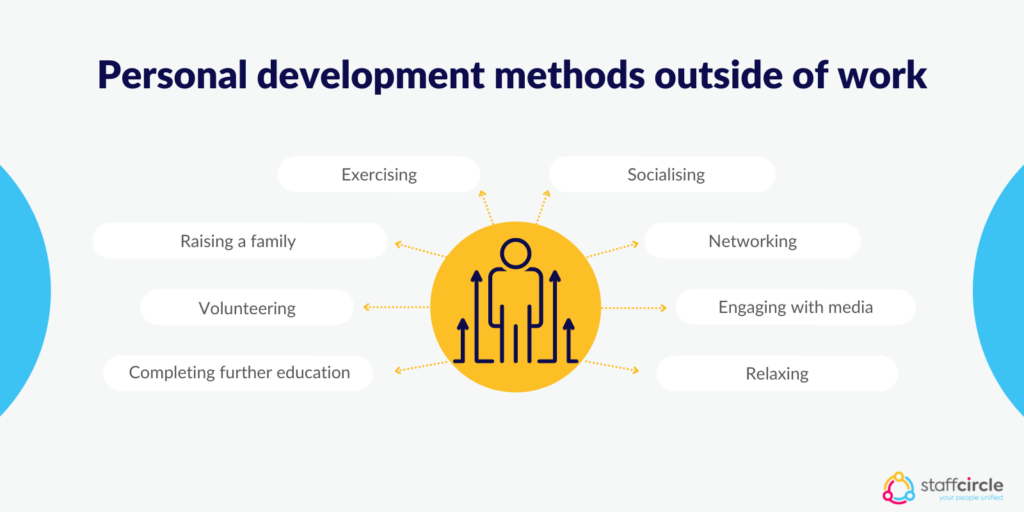
Popular ways to develop personally outside of the working day include:
- Socialising
- Networking
- Raising a family
- Completing further education
- Exercising
- Volunteering
- Engaging with media
- Relaxing
Becoming a “Yes” person
To get ahead at work and develop your skills, sometimes you need to get stuck into new projects or areas. If someone asks for your input, there’s no need to be shy – they clearly already value your opinion.
Becoming a “yes” person is a great way to network with colleagues, develop professional relationships and work on new and exciting projects. Who knows, you may end up learning a new skill that takes you on a different career path!
If you’re looking to develop and progress to management level, this is a great way to get noticed. Being open and flexible to taking on new tasks and more responsibility proves your value and expertise. Even if you’re not an existing subject matter expert, go above and beyond to learn and perform the task to the best of your ability.
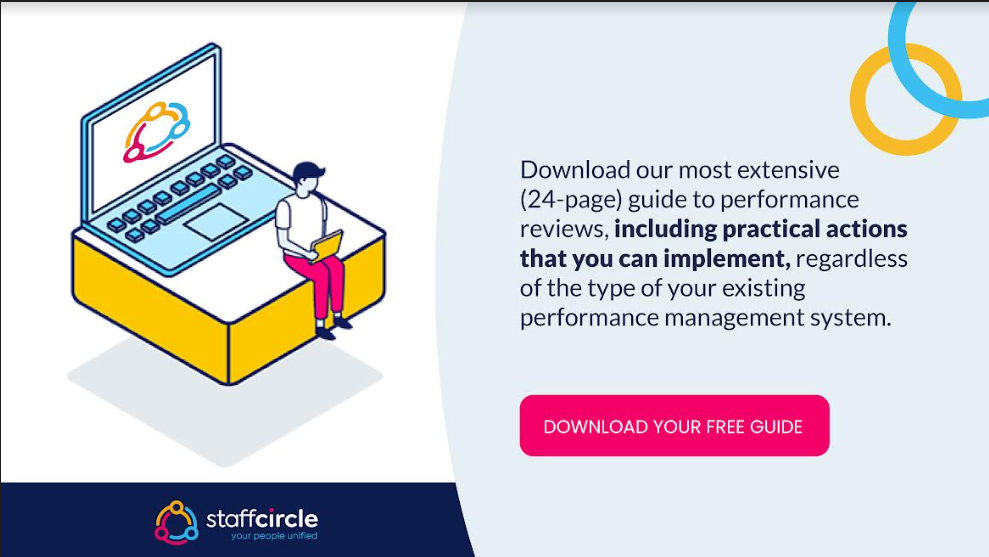
Saying “No” when necessary
Becoming a go-to person for advice and expertise in the workplace can be advantageous, as above. However, you must always consider your own priorities, and not get too caught up trying to please others.
At the end of the day, your own personal goals are important. Helping others can allow you to broaden your horizons and make new connections. However, it can limit your ability to carry out your own work and stunt your progression. Working overtime to help other people with their roles can lead to burnout and stress.
Of course, it’s not always possible to say “no” to a request. If your manager is asking for help, it’s most likely that they’ve already considered your skills and schedule. Even so, you may find that there are times when you need to push back on their request.
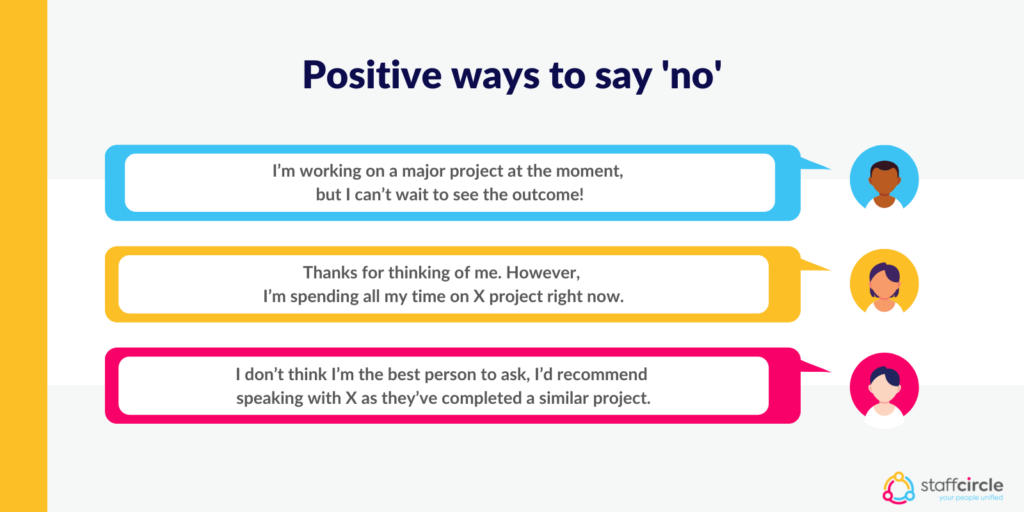
It’s tricky to say “no” when someone asks for help without burning bridges. If you’re unable to find the words, here are some positive examples to help you out when necessary:
- “I’m working on a major project at the moment, but I can’t wait to see the outcome!”
- “Thanks for thinking of me. However, I’m spending all my time on X project right now.”
- “I don’t think I’m the best person to ask, I’d recommend speaking with X as they’ve completed a similar project.”
Using your team’s differences to your advantage
Developing your personal work objectives can be improved when working as part of a diverse team. Working with colleagues of different backgrounds, education and ages broadens your horizons.
It allows you to learn new things, and receive relevant employee feedback which helps to develop your career goals. At the same time, the benefits of learning from a wide range of people helps you to achieve goals in your personal life.
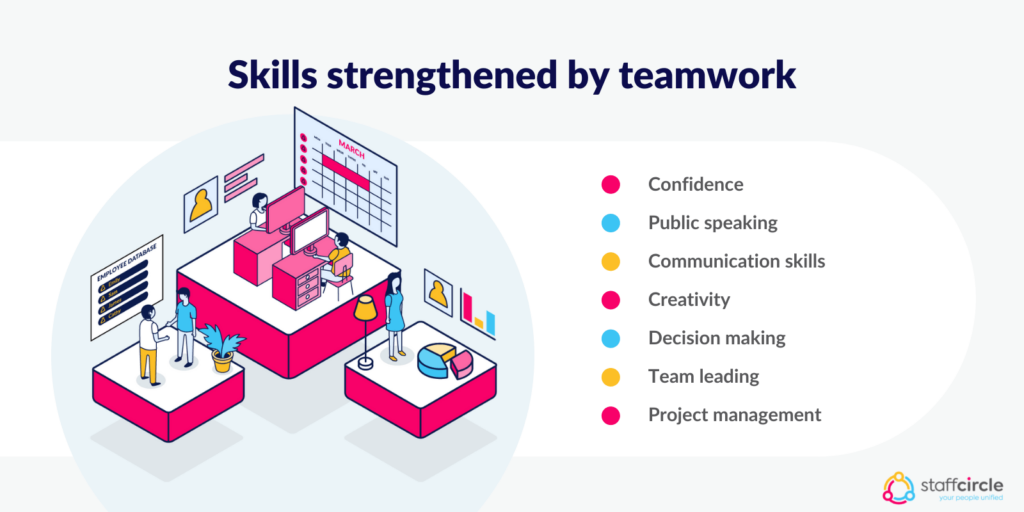
Some of the skills that can be strengthened by teamwork include:
- Confidence
- Public speaking
- Communication skills
- Creativity
- Decision making
- Team leading
- Project management
Learning from the colleagues you meet at all stages of your professional life and working together on projects helps you achieve your professional targets.
Asking for help
When working with a team, you build relationships with those around you. In life, you’re not always going to know the answer to every question. Neither will you have the skills and experience to complete every task.
Although it can feel daunting at first, asking a colleague for their help is perfectly acceptable. On a personal level, it shows that you value their knowledge and improves your working relationship. On a professional level, it gives you the opportunity to learn a new skill from a subject matter expert.
When asking for help, you don’t only need to rely on your peers. Sometimes, a more senior colleague will have the information you need to complete a task. Be mindful of people’s time, but most people will be happy to give you at least a few minutes of their time to discuss a project.
You don’t always need to ask for help on work-related tasks. Sometimes, it can be helpful to connect with someone who could act as a workplace mentor. It could be that there’s someone in your organisation who you admire or even a connection on LinkedIn who you follow and interact with.
Ask if you can have an informal chat so you can understand how they got to where they are. They may be flattered by the request, and their insight and experience can help you focus on your personal goals for the future.
Managing conflicts effectively
You spend a lot of time at work, so it’s important to make sure you’re happy there. It’s inevitable that at one time or another, a colleague may say something or make a decision that you don’t agree with. How you deal with this reflects both the development of your personal and professional goals.
A 2020 study by CIPD covers how conflict at work can negatively affect your professional work development:
“Negative conflict at work also seriously undermines people’s performance and productivity. It is stressful and time-consuming for all concerned, and takes focus away from delivering on objectives and organisational priorities.”
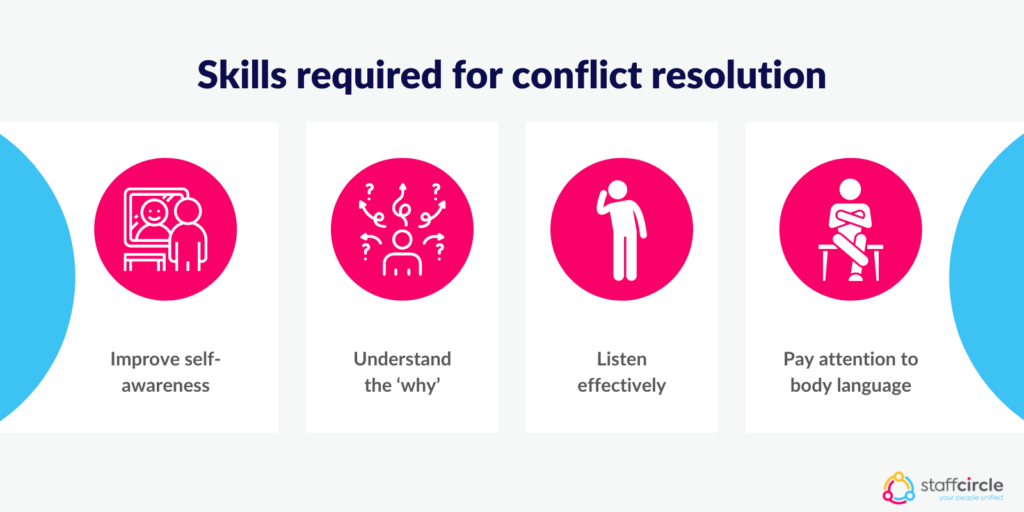
To make sure that you focus on your goals effectively, it’s important to develop conflict resolution strategies. By practising the skills below, you can minimise any stress related to disagreements, or even avoid them entirely.
- Listen effectively
- Pay attention to body language
- Understand the ‘why’ behind frustrations
- Improve emotional self-awareness
Under Promise, Over Deliver
To improve your skills and maintain a healthy work-life balance, it’s important to set reasonable goals. It may seem like a good idea to go above and beyond on every task you’re set. However, this can lead to excessive working, stress and eventually burnout.
Many business professionals use the under promise, over deliver a technique to help remain realistic. When agreeing to a project, they commit to delivering a basic level of work. However, when completing this, they present a much more detailed or polished version. This can give a good impression on their colleague, and help to put them in mind for future opportunities.
However, constantly overdelivering on projects can be harmful to your development. It can appear as though you’re reluctant to accept higher-level projects, are unable to work to a set deadline or don’t understand what was requested. What’s more, when you constantly overdeliver, you could face push-back on any projects that are delivered exactly as outlined.
Instead, aim to be totally realistic when discussing work with your colleagues and managers. Give specific deadlines and a specific outline of the work you’re doing. If you do want to push the boat out, feel free, but make sure it’s in a realistic and time-efficient way.
In Summary
Personal work objectives encapsulate a large number of goals and achievements that ultimately improve your life. This includes focusing on improving individual skills, implementing time management strategies to improve work-life balance or making large changes to land your dream role.
Knowing what you want to achieve is important, but understanding that setting professional development goals and putting strategies in place to actually get there is the key to success. Learning from those around you, being open to change and accepting new responsibilities will help you grow and develop.





